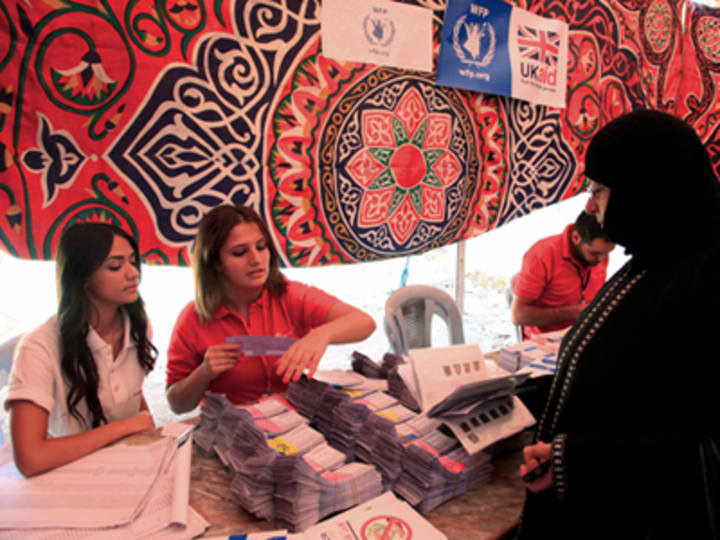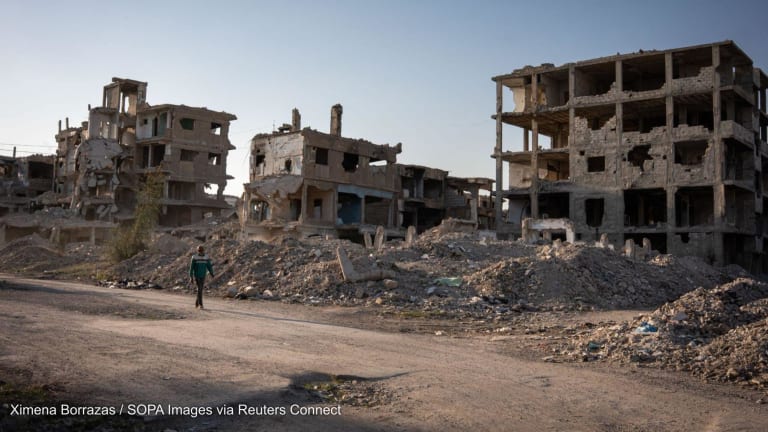
British aid to Syria is a “lifeline” for operations on the ground and the U.K. Department for International Development should be commended for the generosity and “smart” approach of its aid — but as needs continue to rise, finding ways to sustain and increase funding will only become more urgent.
That was the overall conclusion of the discussion on Tuesday at the parliamentary committee for international development, where members of parliament and aid chiefs reviewed the status of the United Kingdom’s humanitarian response and how to continue moving forward after almost three years of conflict in the Arab state.
During the meeting, Amir Abdullah, deputy executive director at the World Food Program, said the United Nations agency alone would require $42 million per week to reach 6.3 million people inside and outside Syria.
Officials from Mercy Corps and Islamic Relief also shared their thoughts with committee members, as part of an ongoing review of the U.K.’s development work in the Middle East.
The region has not been a traditional focus area for U.K. aid. But over the past few years, the sheer magnitude of the conflict in Syria — considered one of the worst humanitarian crises in recent memory — has compelled the U.K. government to ramp up its funding of nongovernmental organizations, U.N. and other agencies. It has since become one of the most generous donors with over 600 million pounds spent up to date — its single largest contribution ever.
READ:UK makes U-turn on Syrian refugees policy
Change the only constant
WFP, Mercy Corps and Islamic Relief representatives told British MPs about the “dire” and “appalling” situation faced by Syrians, and the grave threat posed by the conflict to regional stability. Not only are an estimated 9.3 million people in need of humanitarian assistance inside the country, but a further 2.4 million are now refugees outside Syria.
For some seasoned humanitarian workers, the representatives explained, this is the most complex situation ever experienced, forcing aid agencies to work sporadically and resort to “desperate measures.”
Attempts to deliver assistance — including negotiating with armed rebels and government forces access to the areas they control — can only be made on a case by case basis, said Jehangir Malik, executive director of Islamic Relief, who added: “Changing plans is the only fixed situation here; everything is constantly fluid.”
Such unpredictability makes U.K. aid even more valuable.
“DfID is a particularly smart donor,” noted Nigel Pont, regional director for Syria at Mercy Corps, and “very helpful in terms of providing flexible long-term funding.” The department should not only continue this good work, he said, but also encourage other donors to work in a similar way.
DfID contributes to the tri-departmental Conflict Pool fund, for example, which financed a Mercy Corps project to set up and equip local committees to address tensions between host and refugee communities in Jordan. Such interventions — looking beyond the most immediate needs to the longer term — can prove “really good value for money,” stressed Pont.
And while much needs to be done to ensure development funding streams work well alongside emergency aid, humanitarian actors do benefit from well-established coordination mechanisms, MPs were told.
“In this crisis, with so many things that can potentially go wrong, coordination has actually been one of the success stories,” said Abdullah.
Speedier innovation may be another small silver lining. WFP and UNHCR are piloting different methods for distributing aid via e-card systems — the urban equivalent of cash vouchers, redeemable at ATMs or in shops — with the ultimate goal of ending up with a single, common system.
Strapped for cash
Last Saturday, the U.N. Security Council finally passed a resolution demanding safe and unhindered humanitarian access to those in need in Syria. It remains to be seen, however, how effective this measure will be given the omission of any mention of sanctions.
But whatever happens, the need for funding will not go away.
Islamic Relief has already received 2 million pounds from DfID for its work in Syria — a “lifeline” according to the organization’s director: “We couldn’t do half the job we’re doing without that support.”
The U.K. has committed a total of 150 million pounds to date to WFP’s operations in Syria and its neighbours — a ‘phenomenal’ contribution, said Abdulla. But is that enough? Not according to the U.N. agency, whose annual budget to meet Syria’s needs equates to roughly 2 billion pounds, over half of the total contributions received for WFP’s operations around the world.
This means that the U.N. agency would have to divert funds from other programs to continue its operations in Syria, even if providing food aid to six million Syrians would cost less than a dollar per person per day, according to Abdullah, who called this “real value for money.”
“For less than the price of a cup of coffee per day, we’re managing to deliver food sustenance in what is basically a war zone,” he said.
The international development committee will hear further evidence in the coming months on U.K. aid in the Middle East, before publishing a report later this year.
In its written submission to the committee, DfID also said it is developing an “independent monitoring program” to gather information on the work of its partner organizations, to be operational by the end of the year.
What will the full picture of U.K. support to the Middle East look like? And how will the U.K. — and other donors — sustain and expand aid at the massive scale required? Have your say by commenting below.
Read more development aid news online, and subscribe to The Development Newswire to receive top international development headlines from the world’s leading donors, news sources and opinion leaders — emailed to you FREE every business day.
See more:




